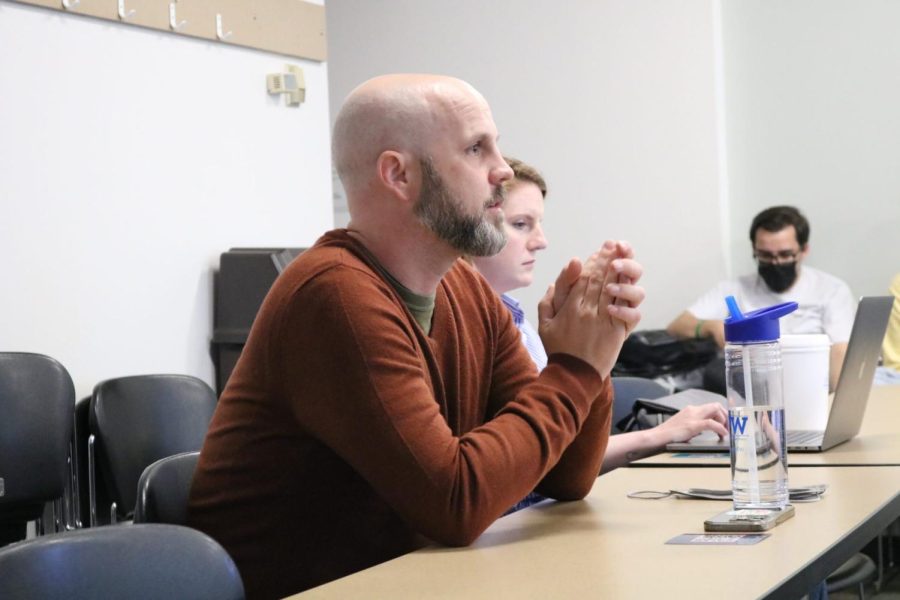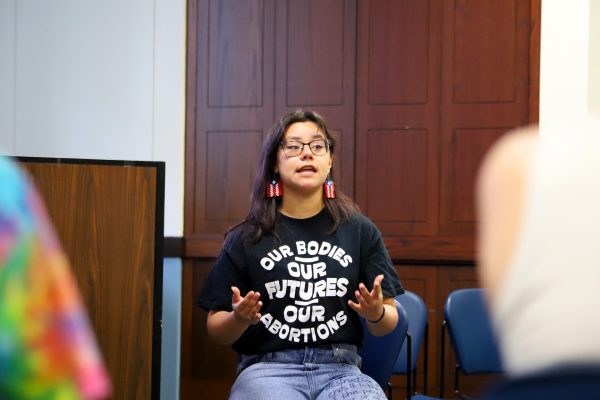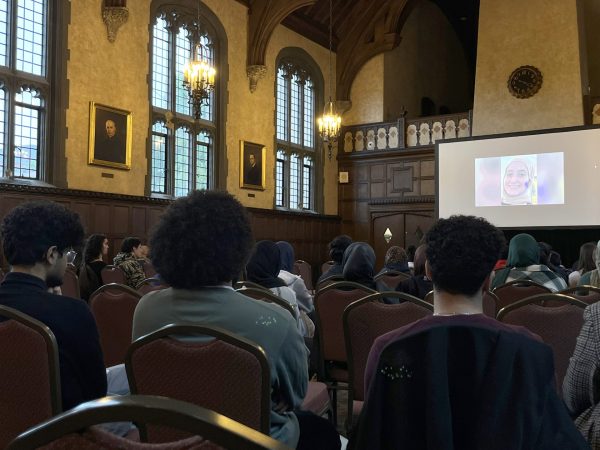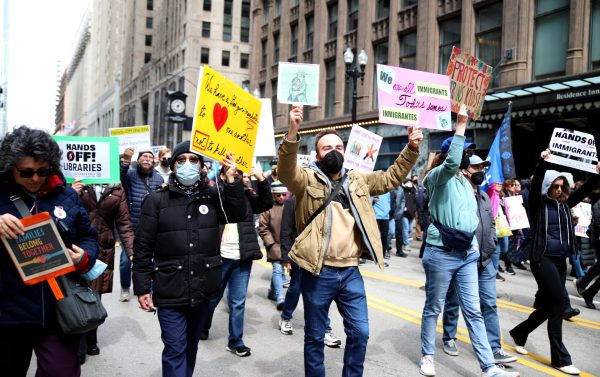Reproductive rights town hall addresses contraceptive distribution on campus
Kiersten Riedford for The DePaulia
Tyler Wurst, the new director of the Office of Health Promotion and Wellness, was present at the town hall to discuss DePaul’s campus resources. This is his first SGA appearance.
The DePaul Student Government Association will inquire to the university about distributing contraceptives, such as condoms, on campus. The DePaul Restriction on public distribution of inappropriate health and medical devices/supplies does not allow issuing them on campus.
Students brought up this concern during the SGA reproductive rights town hall on Thursday, May 26. SGA wanted a space for students to voice their concerns about reproductive rights after the leak of the Supreme Court’s opinion to overturn Roe v. Wade.
The policy was implemented in 2005 and was last updated in 2016 which states that the university does “encourage educational programs that provide a balanced view on health related and lifestyle issues and choices. It is expected that a Catholic teachings be provided as a part of these programs.” This was brought under former university president Rev. Dennis Holtschneider.
Representatives from SGA, the Women’s Center and the Office of Health Promotion and Wellness (HPW) were also present, including new HPW director Tyler Wurst. He confirmed at the meeting that the DePaul policy prohibits this.
“The policy is that we just can’t be sending out birth control or any other medical assistive devices,” Wurst said on Thursday.
Previous DePaulia reporting has stated that due to DePaul’s “connection with the archdiocese,” student organizations and departments are banned from condom distribution.
Incoming SGA Vice President Magoli Garcia created three priorities for the SGA to work on for the 2022-2023 school year. This will include initiatives for condom distribution.
About 85 percent of colleges and universities in the U.S. distribute free condoms on campus, according to a study done in 2018.
Courtney James, advisor of SGA and director of student involvement, said at the meeting that this initiative has been stuck at SGA for the past seven years.
“Probably every other year, a group of students comes and sits down with us to talk about the policy with a specific emphasis on condoms,” James said. “[Wurst’s] predecessor, Shannon, and I would have a lot of conversations. In my seven years at DePaul, the conversation has always stuck there.”
However, Garcia wants these initiatives to move past SGA.
“The main focus of the town hall is for SGA to work together with students to brainstorm types of resources that SGA can work to provide to the community here at DePaul,” Garcia said.
Currently, DePaul offers HIV and STI testing for free on campus provided by the AMITA Stage Medical Group, according to the DePaul division of student affairs page.
Priorities will also include possible modules for incoming freshman about sexual health. This would be similar to placement tests for math and writing. There was also a push from student concerns to create and implement programs dedicated to gender violence for athletes and fraternities. These initiatives will be worked on during the summer to execute during the 2022-2023 school year.
Jasslyn Hodges, a resident advisor (RA) and senator for community and government relations, said that RAs are holding events in their residence halls throughout the year.
“I know that a lot of RAs really implement that in many of their first-year buildings, because a lot of residents who come in don’t have that comprehensive sex education while they’re in high school or middle school,” Hodges said at the meeting. “Whatever education they may have had beforehand is not comprehensive compared to how it would need to be in order to combat some of the things we’re discussing today.”
Organizers also wanted the SGA town hall to be a safe space for queer and BIPOC people to voice their concerns.
“In general there has always been a lack of inclusion when discussing reproductive rights and in the feminism movement for women of color, members of the LGBTQ+ community and people with disabilities,” Garcia said. “That is why this town hall is so crucial to provide on campus. It is not the answer, but it is the first step into ensuring the inclusion of those marginalized voices.”
The Women’s Center representative acknowledged the disparity in a statement at the beginning of the town hall.
“We are aware that this country has never been a safe space for BIPOC, queer, low-income incarcerated and undocumented individuals to receive proper reproductive care and assistance and the current conflict against Roe v. Wade will affect these individuals the most,” the Women’s Center representative said.
One student brought up the lack of inclusion in the Rise Up 4 Abortion Rights chapter led by DePaul students. The student said that speakers at on and off-campus protests were not inclusive to communities of color. SGA is not affiliated with this organization.
“We overheard students’ complaints and assured them we are going to work to address this issue with the university,” said Riley Reed, SGA senator for LGBTQ+ students.
Several students did affirm how they felt safer expressing their thoughts at the town hall rather than in their classrooms or other campus spaces.
“There were several students who said they were glad they came and were able to voice their concerns in a space that was more open than perhaps the other spaces on campus,” Reed said. “Since this was organized for BIPOC students to speak out, it raises awareness of how a lot of spaces of activism, especially around abortion rights, are cis and white-led.”
Ideas for the proposed initiatives will be further discussed at SGA.
“We walk past that statue every single day that says, ‘What are you doing for justice’ and reproductive rights is a justice issue,” James said at the meeting. “Even if the policy does outline that, I think you all in the spirit of the Vincentian question, have an obligation to challenge and talk about it.”







